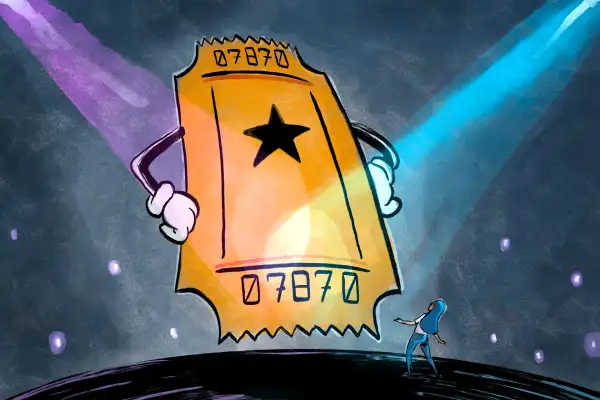Why Ticket Service Fees Are so Annoyingly High — and How to Avoid Them

Concertgoers, rejoice: With 150 million people fully vaccinated in the U.S., live music is finally coming back. All at once, it seems like every performer is suddenly announcing new tour dates. Dave Matthews Band, the Jonas Brothers, Lady Gaga — you can take your pick, and open your wallet to buy tickets again.
Unfortunately, the return of concerts also means the return of ticket service fees. While you may have sorely missed going to shows during the COVID-19 pandemic, you probably did not miss that extra $50 charge on top of the cost of your seat. The frustratingly vague "convenience fee" makes even nosebleeds expensive.
What do those fees even go to, anyway? According to David Goldberg, a longtime ticketing executive and investor, people used to have to go in person to actual box offices to buy tickets to events. When ticket sales started to go remote, companies had to pay for the service of hooking up computers and hiring staff to answer the phones. Hence the service fee.
We’ve come a long way since then, but the infrastructure costs remain.
“I think people have this misconception that it’s easy and cheap to sell a ticket on the internet,” Goldberg says. “While you don’t have to pay a phone operator or a clerk, that doesn’t mean that it’s free.”
Read below to learn more about ticket service fees — and how to avoid them.
What is the service fee for tickets?
Goldberg explains there are different business, and therefore fee, models for different levels of ticket companies.
Ticketmaster, AXS and SeatGeek are considered primary sellers, while StubHub and Vivid Seats are secondary sellers.
We'll tackle primary sellers first. Goldberg gives an analogy: Say you go to Madison Square Garden for a concert. When you go to buy a beer from the concession stand, it costs $15. It can be frustrating; you can get the same beer from your local convenience store for $5. What gives?
He said that’s because there are multiple concessionaires who bid every few years for a contract giving them the right to sell that beer at Madison Square Garden. In order to win the contract, they have to make big promises not just about providing great choice and service but also about how much money they can give back to the venue. In order to make good on those promises, they may have to charge $15 for a $5 beer.
It works similarly with ticket sales. Companies have to bid to be the exclusive ticket provider for venues, and to get chosen, they have to cut deals. (Ticketmaster, it's worth noting, has been hit with multiple class-action lawsuits for the company's lack of transparency).
“In most cases, a significant portion or a majority of those service fees get paid to the venue or the promoter of the event you’re buying the ticket for,” Goldberg adds. “It's another revenue stream. As much as Ticketmaster or AXS or SeatGeek is the one charging the consumer that fee, they're doing it as a vendor on the behalf of the venue.”
Indeed, Ticketmaster’s website says that “in exchange for the rights to sell their tickets, our clients typically share in a portion of the fees we collect,” with some going toward software, equipment, services and administrative support. The rest, “when taken with other revenues, is how we earn a profit.”
Why do websites charge ticket service fees?
Service fees, also called convenience fees, don’t come out of thin air. Goldberg says they’re actually spelled out in the contracts. But that doesn’t make them any cheaper — or less frustrating to encounter when you're trying to score front-row seats.
A 2018 report from the Government Accountability Office found that primary ticket providers charged, on average, 27% of a ticket’s price in fees. As the news release said, “some ticket websites GAO reviewed did not clearly display fees or disclosed them only after users entered payment information,” leading to consumer protection concerns.
Secondary sellers are a different story. Christine Yeo, marketing and communications manager for Vivid Seats, explains that Vivid Seats is a marketplace. It vets sellers and allows them to post tickets online for resale.
Yeo says Vivid Seats’ “service fees go toward a couple of different things,” including operating costs, “things to actually keep our lights on,” customer service and the technology that powers its system. There’s also a delivery fee that helps fund the process of sending out the tickets via email and mail.
How to avoid paying ticket service fees
Vivid Seats has a rewards program where you can earn cash back on your ticket purchases and redeem it in the app. You can also check out credit card perks, like the Savor Rewards card from Capital One, which gives customers 4% cash back on entertainment.
If you're willing to go old-school, you often can save money on ticket fees by buying directly from a venue’s physical box office. (There are also no-fee ticket sites like TickPick that are dedicated to selling tickets without fees.)
Bottom line? Ticket fees are high but not entirely arbitrary. While secondary sellers use them to stay in business, primary sellers generally charge service or convenience fees because, if they want to secure contracts with venues, they have to.
“It just becomes a part of the overall economics of going to an event,” Goldberg says.
More from Money:
Why You Should Have a Separate Savings Account Just for Beyoncé Expenses, According to Financial Experts
The Dangers of Using Trendy Online Installment Programs to Buy Stuff You Can't Afford
The Secret to Saving the Perfect Amount of Money Every Time You Get Paid
